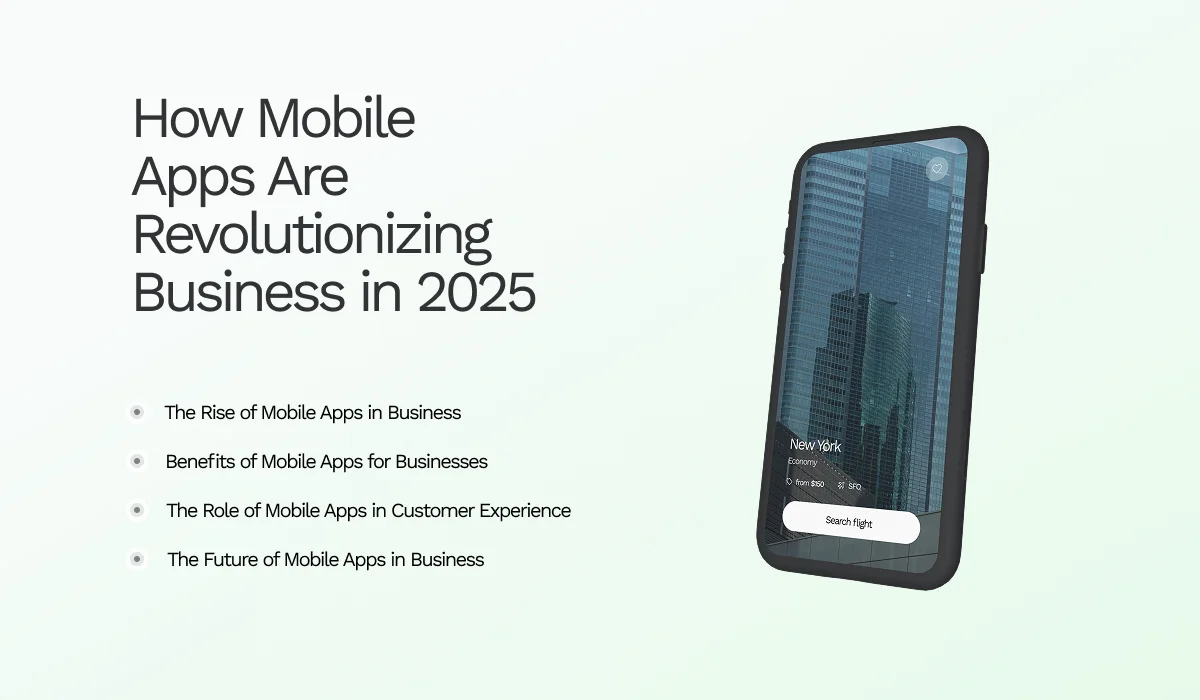Introduction: Mobile apps aren’t just nice-to-haves anymore in 2025 – they’re the backbone of how businesses connect with us and get stuff done behind the scenes. I can’t believe how quickly companies in every industry jumped on board, but they had to keep up somehow! It’s pretty wild seeing businesses that used to do everything the old-school way now letting me order, track, and chat with them through my phone. What blows my mind is how these apps turn traditional business approaches upside down, creating possibilities that would’ve seemed like science fiction not long ago. I want to share what I’ve noticed about this transformation, point out some cool trends that are popping up, and explain why any business that isn’t embracing mobile tech will probably get left in the dust, both now and in the years ahead.
The Rise of Mobile Apps in Business
We’ve watched mobile apps transform from basic little tools into game-changing business must-haves. It’s crazy how essential they’ve become, especially lately. Last year and now into this one, app usage just exploded—it seems like every business is scrambling to connect with us through our phones and streamline their backend stuff.
The numbers are mind-blowing. 7 out of 10 of us would rather use an app than visit a website for shopping, entertainment, or getting help. No wonder companies are pouring money into app development, with the market headed toward a whopping $407 billion by 2026!
Look at Uber – they completely flipped the transportation world on its head by creating an app that hooks up passengers and drivers without hassle. And Starbucks? Their app has people returning for more while boosting their sales like crazy. These examples show how mobile apps aren’t just nice extras anymore – they’re reshaping industries and changing how business gets done.
Benefits of Mobile Apps for Businesses in 2025
Companies can talk directly to customers through their apps, sending personalized alerts, special deals, and updates that keep people coming back. This is a game-changer for building lasting loyalty.
- Increased Customer Engagement: The backend benefits are enormous. We’ve seen businesses use apps to handle tedious daily tasks, monitor inventory and shipments, and answer customer questions—all from one place. This efficiency cuts costs and makes better use of what they have.
- Improved Operational Efficiency: These apps collect valuable customer information. Businesses can see exactly how people behave, what they like, and how they interact with products. That data is gold for creating effective marketing and improving what they sell.
- Enhanced Data Collection and Analytics: Apps mean businesses don’t need as many physical locations or resources. They can grow operations without the usual headaches and reach customers worldwide without breaking the bank.
- Cost-Effectiveness and Scalability: Mobile apps reduce the need for physical space, making it easier and cheaper for businesses to scale. They also offer an affordable way to connect with a global audience—no massive overhead or extra costs are needed.
Check out our Mobile App Development Services for more information.
Case Study: Sephora’s app suggests products based on what you actually like and use. This personal touch makes shopping way better and drives both engagement and sales.
It’s clear why businesses are betting on apps as their ticket to growth in 2025 and beyond.
Mobile App Innovations Shaping the Future
Mobile apps are getting seriously advanced, and AI, AR, and blockchain are taking business capabilities to a whole new level. These aren’t just buzzwords—they’re already changing how companies serve us.
- AI Integration: AI has quietly slipped into the apps we use daily. Those helpful chatbots that answer questions instantly? That’s AI working behind the scenes. And businesses are using AI to predict what we might want before we know it ourselves. It’s pretty wild how much smarter these apps are getting at understanding our habits.
- Augmented Reality (AR): AR is the coolest tech we’ve seen lately. Nike’s app lets you see how shoes look on your feet before buying—no more return headaches! It transforms shopping from guesswork into something fun and valuable.
- Blockchain Technology: Blockchain is making waves in finance and supply chain apps. It sounds technical, but our transactions are super secure and everything’s tracked transparently. It’s building trust in industries where security matters.
Example: L’Oréal is a perfect example of this stuff working in real life. The ability to virtually try on lipstick or eyeshadow before purchasing is genius, and people are buying more because of it.
What’s exciting is that these technologies aren’t just concepts anymore – they’re already making money and changing industries, and they’ll only get more impressive as we move through 2025.
The Role of Mobile Apps in Customer Experience
Customer experience can make or break a business these days, and mobile apps are leading the charge in creating experiences that keep people coming back.
- Personalization: The personalization aspect is huge. I love how Spotify reads my mind with its playlists – their app tracks what I listen to and serves up more of what I like. Innovative businesses do this across industries, making me feel like their services were built just for me.
- Ease of Use: An app has to be dead simple to use, though – I’ll ditch it in seconds if I can’t figure it out right away. The best ones let me do what I need without thinking about how to navigate around.
- Instant Access: What sells me is convenience. Whether grabbing a last-minute flight, ordering dinner when I’m starving, or needing help with something I just bought, having instant access through an app beats waiting on hold or standing in line any day.
- Mobile-First Design: Since most of us now live on our phones, innovative companies design for mobile first. There is nothing worse than an app that feels like it was built for a computer and then crammed onto my phone as an afterthought.
We’ve noticed more businesses building customer service right into their apps, too. When I can chat with someone, submit a ticket, or find answers without switching to email or making a call, I’m way more likely to stick with that brand. These little touches in solving problems quickly make all the difference in whether we keep using a service.
The Future of Mobile Apps in Business
The mobile app scene is about to get even more impressive. With 5G rolling out everywhere, AI getting smarter, and Automation taking over routine tasks, we’re in for significant changes in how businesses operate.
- 5G Technology: 5G will be a game-changer – We’ve tried it in a few places, and the difference is mind-blowing. When everyone has access to those speeds, businesses can finally deliver the ultra-responsive, graphics-heavy experiences they’ve been dreaming about. Gaming apps will feel console-quality, virtual shopping will work like real shopping, and AR will finally lose that laggy feeling that breaks the immersion.
- App-Based Business Models: I’ve noticed more companies shifting their entire business model around their apps. Do we all have those monthly subscriptions now? That trend is just getting started. Expect more exclusive in-app content and loyalty programs that give you perks worth having. Many businesses’ physical locations or websites might become secondary to their app experience.
- AI and Automation: I’m most curious about AI advancements. Soon, apps won’t just respond to what we ask—they’ll anticipate what we need before we even open them. Imagine an app that automatically reschedules your food delivery because it detects you’re running late or adjusts your shopping recommendations based on the weather forecast for your weekend plans. Customer service could happen without us even realizing there was a potential problem.
Conclusion
Mobile apps are no longer optional—they’re essential in 2025. The most successful businesses have made apps central to operating, connecting with customers, and innovating. With AI, AR, and 5G evolving fast, we’re only beginning to see what’s possible. Any business that wants to stay relevant must invest in a strong mobile strategy now, or risk being left behind in 2025 and beyond.




